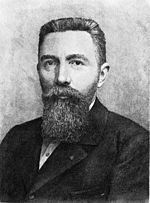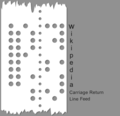The Baudot code (French pronunciation: [bodo]) is an early character encoding for telegraphy invented by Émile Baudot in the 1870s. It was the predecessor...
57 KB (2,980 words) - 21:28, 19 November 2024
communication Baudot code, was one of the pioneers of telecommunications. He invented a multiplexed printing telegraph system that used his code and allowed...
14 KB (1,738 words) - 14:11, 13 September 2024
The first of these was the Baudot code, a five-bit code. Baudot has only enough code points to print in upper case. Later codes had more bits (ASCII has...
63 KB (6,313 words) - 10:04, 23 October 2024
telegraph engineer, inventor of the Baudot code Anatole de Baudot (1834-1915), French architect Technology: Baudot code, a way to encode characters for sending...
364 bytes (79 words) - 02:57, 12 March 2022
MCM was designed around the five-bit Baudot code established by the older TTY machines instead of the ASCII code used by computers. The MCM was an instant...
25 KB (2,908 words) - 10:23, 14 July 2024
character codes generally succeeded the five-bit Baudot code and preceded seven-bit ASCII. Six-bit codes could encode more than 64 characters by the use...
43 KB (1,213 words) - 04:49, 8 September 2024
Control character (redirect from Control code)
the 1870 Baudot code: NUL and DEL. The 1901 Murray code added the carriage return (CR) and line feed (LF), and other versions of the Baudot code included...
25 KB (3,449 words) - 00:14, 19 December 2024
by the label "BEL". They have been used since 1870 (initially in the Baudot code). To maintain backward compatibility, video display terminals (VDTs)...
5 KB (525 words) - 17:32, 25 September 2023
punched tape transmission. These systems led to new telegraph codes, starting with the Baudot code. However, telegrams were never able to compete with the letter...
79 KB (9,825 words) - 00:12, 22 December 2024
replaced skilled operators versed in Morse code with typists and machines communicating faster via Baudot code. With the development of early computers...
53 KB (6,690 words) - 11:06, 7 December 2024
Standard five-bit standard codes are: International Telegraph Alphabet No. 1 (ITA1) – Also commonly referred to as Baudot code International Telegraph Alphabet...
7 KB (894 words) - 05:03, 22 April 2024
Escape sequence (redirect from Escape code)
communication speeds. Escape sequences date back at least to the 1874 Baudot code. The Hayes command set, for instance, defines a single escape sequence...
16 KB (1,848 words) - 23:45, 16 November 2024
Character encoding (redirect from Character code)
but the path of code development to the present is fairly well known. The Baudot code, a five-bit encoding, was created by Émile Baudot in 1870, patented...
32 KB (3,920 words) - 17:56, 19 December 2024
one dimension. When the French engineer Émile Baudot changed from using a 6-unit (6-bit) code to 5-unit code for his printing telegraph system, in 1875 or...
181 KB (15,917 words) - 11:17, 6 November 2024
representation of a numeric code that identifies the object to which it is attached Baudot code, used in telegraphy Diagnosis code, used to translate medical...
6 KB (766 words) - 02:24, 28 September 2024
second are equivalent. The baud unit is named after Émile Baudot, the inventor of the Baudot code for telegraphy, and is represented according to the rules...
7 KB (937 words) - 01:36, 26 November 2024
album's cover art combines colours and blocks to represent the title in Baudot code. The album contains twelve tracks, divided into respective halves labeled...
107 KB (8,324 words) - 21:05, 21 December 2024
A companion Teletype Model 32 used the older, established five-bit Baudot code. Because of its low price and ASCII compatibility, the Model 33 was widely...
27 KB (3,302 words) - 23:31, 13 December 2024
byte) today, other options like the 6-bit character code were once popular, and the 5-bit Baudot code has been used in the past as well. The term has even...
17 KB (2,022 words) - 11:28, 19 December 2024
ASCII (redirect from ASCII code)
(1963), more than 64 codes were required for ASCII. ITA2 was in turn based on Baudot code, the 5-bit telegraph code Émile Baudot invented in 1870 and...
109 KB (8,115 words) - 14:14, 18 December 2024
Offset binary (redirect from Diamond code (coding theory))
The 5-bit Baudot code used in early synchronous multiplexing telegraphs can be seen as an offset-1 (excess-1) reflected binary (Gray) code. One historically...
23 KB (1,636 words) - 09:20, 2 October 2022
recasting of the ITA2 character encoding, known as Baudot code, from a five-bit code to a seven-bit code. In each character, exactly four of the seven bits...
14 KB (272 words) - 12:42, 2 March 2023
used in different contexts. Historically, Baudot code could be considered a modified (stateful) base32 code. The 32 symbols are 0,1,2,3,4,5,6,7,8,9,A...
21 KB (2,125 words) - 05:22, 7 December 2024
Fish (cryptography) (section Traffic code names)
alphabet. The teleprinter code used was the International Telegraph Alphabet No. 2 (ITA2)—Murray's modification of the 5-bit Baudot code. When the Germans invaded...
14 KB (1,474 words) - 13:57, 19 October 2023
complexity to "filter out" spurious additional CR signals. As early as 1901, Baudot code contained separate carriage return and line feed characters. Many computer...
6 KB (720 words) - 01:17, 3 April 2024
and the inventor of a telegraphic typewriter system using an extended Baudot code that was a direct ancestor of the teleprinter (teletype machine). He...
5 KB (560 words) - 09:46, 4 December 2023
read Italian language, by ISO 639-2 language code International Telegraph Alphabet, also known as Baudot code Independent Television Authority, the regulator...
4 KB (484 words) - 22:22, 17 July 2024
accepted around the world. The next improvement was the Baudot code of 1874. French engineer Émile Baudot patented a printing telegraph in which the signals...
78 KB (9,228 words) - 15:06, 10 November 2024
in teletypewriter operation. Mechanical teleprinters using 5-bit codes (see Baudot code) typically used a stop period of 1.5 bit times. Very early electromechanical...
7 KB (798 words) - 07:32, 29 November 2024
acoustic mechanism for landmine detection, and an electronic Morse Code/Baudot code keyboard using a diode matrix and 66 TTL integrated circuits for Amateur...
8 KB (703 words) - 17:28, 17 April 2024














